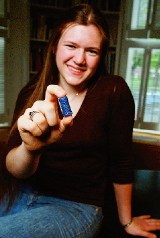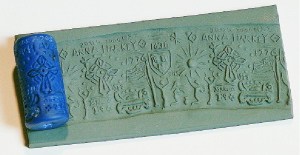Anna Harkey's cylinder seal, when rolled across damp clay, yields an autobiography in relief. The image includes her name in English, the year she was born (1982), the year she graduated from high school (2001)which is also the year she made the seal (as a student in Professor Irene Winter's freshman seminar on the archaeology and art of cylinder seals in the ancient Near East)and the year she will graduate from the College (2005); a Harvard shield with the date 1636; a cuneiform symbol found on Mesopotamian seals of royalty; a sun to reflect her love of nature; dancerswith one holding a pot, representing her interest in the performing arts and pottery (she was involved in seven productions freshman year, as actress, set designer, et cetera, and she likes to throw pots on her mother's wheel); the flag of the United States with the date 1776 (the flag backwards by mistake); a cross to symbolize her (Christian) religion, with one of her favorite verses from the Bible (Joshua 1.9: "Have I not commanded you? Be strong and courageous...."); and an attempt at "Anna" in Mayan glyphs because of her interest in Meso-American archaeology (she subsequently learned that she got some of this wrong, too). Harkey made the seal because one of the eight students in the seminar said that she and others in another class had attempted to make seals, it hadn't worked, and there was no point in trying.
 |
| A modern version of an ancient object. Mesopotamian seal carvers worked in stone such as alabaster, marble, hematite, and quartz, but Anna Harkey assayed the art form using clay. She chose deep blue clay to suggest lapis lazuli, a gemstone the ancients did sometimes obtain from abroad and use for seals. |
 |
| Photographs by Jim Harrison |
Cylinder seals appeared in Mesopotamia in the fourth millennium B.C.E. and continued in use for administrative and other purposes for more than 3,000 years, until parchment as a writing surface came along. They offer archaeologists clues to many aspects of ancient Near Eastern life, from religion to economics.
Winter is Boardman professor of fine arts and has a special interest in the art of Mesopotamia. When the Harvard University Art Museums recently obtained a collection of cylinder seals, she was intrigued by the new arrivals, a passion she was prepared to pass around. According to the handbook describing the Freshman Seminar Program, the seminars "share only the assumptions that the work being done is elective for both the seminar leader and the students, that the investigations will require a good deal of independent work on the part of the freshmen who enroll, and that the students and the seminar leader will be actively engaged in intellectual pursuits of mutual interest." Winter put her freshmen to work attempting to date and otherwise document the seals.
The Freshman Seminar Program will offer 89 seminars this year, up from 60 last year. Former dean of the Faculty of Arts and Sciences Jeremy R. Knowles had urged that the number of seminars be upped. "Our aim is to meet the demand from students," says the program's associate director, Gerard F. Denault, who notes that, historically, three out of four applicants to the limited-enrollment seminars have had to be turned down. Last year about 900 freshmen wanted to take a seminar, and so, theoretically, says Denault, 89 seminars might meet this year's demand.
Harkey has aspired to a career in archaeology since at least the sixth grade. From Shelby, North Carolina, and now Eliot House, she spent part of this summer excavating an old village under the auspices of the Chapel Hill Field School. Back in Cambridge for more explorations, she will no doubt add, at least figuratively, a few more symbols to her seal.




